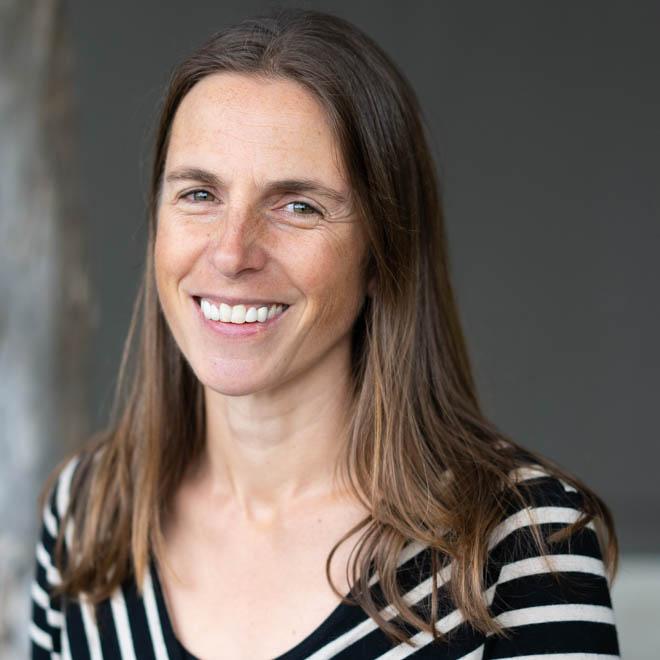Melissa Foley
Melissa Foley, PhD
Program Science Director
Bay Regional Monitoring Program
Nutrients
Resilient Landscapes Program
Urban Nature Lab
(510)746-7345
Melissa Foley is Science Director of the Resilient Landscapes Program at SFEI. She has extensive experience working in interdisciplinary teams on a wide range of topics, including ecosystem change and resilience, spatial planning, cross-habitat connectivity, dam removal, cumulative effects, long-term monitoring, and ecosystem-based management. Melissa received her B.S. from Oregon State University and her PhD from the University of California Santa Cruz.
Related Projects, News, and Events
 Regional Analysis of Potential Beneficial Use Locations: San Francisco Bay (Project)
Regional Analysis of Potential Beneficial Use Locations: San Francisco Bay (Project)
SFEI and partners are engaged in a long-term effort to define and quantify baylands resilience for San Francisco Bay through the Baylands Resilience Framework. In developing this framework, we ask: How can baylands resilience be measured? How can it be increased?
 RMP Update (Project)
RMP Update (Project)
The Regional Monitoring Program for Water Quality in San Francisco Bay is an innovative collaboration of the San Francisco Bay Regional Water Quality Control Board, the regulated discharger community, and the San Francisco Estuary Institute. It provides water quality regulators with the information they need to manage the Bay effectively. The RMP produces two types of summary reports: The Pulse of the Bay and the RMP Update. The Pulse focuses on Bay water quality and summarizes information from all sources.
 Next Generation Urban Greening (Project)
Next Generation Urban Greening (Project)
SFEI is working with partners across the Bay Area to design tools to help cities achieve biodiversity, stormwater, and climate benefits through multifunctional green infrastructure.
 Conceptual Understanding of Fine Sediment Transport in San Francisco Bay (Project)
Conceptual Understanding of Fine Sediment Transport in San Francisco Bay (Project)
Sediment is a lifeblood of San Francisco Bay. It serves three key functions: (1) create and maintain tidal marshes and mudflats, (2) transport nutrients and contaminants, and (3) reduce impacts from excessive human-derived nutrients in the Bay. Because of these important roles, we need a detailed understanding of sediment processes in the Bay.
 Big problem, small size: Improving methods in microplastics research (News)
Big problem, small size: Improving methods in microplastics research (News)
When it comes to plastic pollution, that candy wrapper half buried in the dirt is only the tip of the iceberg. Plastic bags, cigarette butts, and bottle caps are not just an eyesore, but over time they break down in the environment, creating small pieces of debris known as microplastics. Microplastics can include anything from synthetic fibers of clothing to industrial pellets from the plastic manufacturing process. Microplastics are now ubiquitous in our environment--found in our air, drinking water, sediment, and in the San Francisco Bay and global ocean.
The San Francisco Estuary Partnership (SFEP) brings together the estuarine community every two years at the State of the Estuary Conference and, periodically, SFEP also reports on the State of the Estuary, summarizing the latest scientific findings about ecosystem health. This State of the Estuary Report is the only place where a holistic view of ecosystem function is provided across both the Bay and the Delta. This year, SFEI provided scientific leadership and technical support for the report, which focuses on the ties between social and ecological resilience for our estuary.
 Introducing the New RMP Manager: Dr. Melissa Foley (News)
Introducing the New RMP Manager: Dr. Melissa Foley (News)
SFEI is very pleased to announce that Dr. Melissa Foley joined our staff as the new RMP Manager in late December. She is a marine ecologist by training but an interdisciplinary scientist in practice. She has extensive experience working with scientists, lawyers, decision-makers, tribes, and stakeholders on a wide range of topics, including water quality, wildfire, dam removal, cross-habitat connectivity, ocean acidification, spatial planning, cumulative effects, ecological tipping points, and ecosystem-based management.

